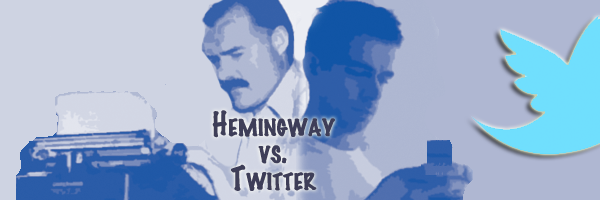We are a generation whose parents gave us endless reams of cheap paper with disposable ballpoint pens to espouse our most important intermusings. These same parents, seeing the technological limitations to what could be recorded, expanded our cache of pages exponentially when they bought us PCs and rapid fire keyboards, giving us access to silicon repositories for a truly infinite receptacle for every typed out thought. By the 1990s the Internet was being flooded with the brilliant ideas of a new generation.
The problem? Nobody cared.
“The cacophony more closely resembles citizens band radio, complete with handles, harassment, and anonymous threats. When most everyone shouts, few listen.”
-Clifford Stoll circa 1995
Websites had no character limits and original ideas got buried within the pages of indexed archives. Real-time meant earlier that day and the Internet was a soup of disparate information accessed by bushwackers looking for an adventure, not relevancy.
In 1997 two major social media offerings changed everything: SixDegrees.com and AOL Messenger. Self-governance corrected users who SHOUTED, encouraged emoticons and practiced Internet Slang. We learned to keep it brief, something today’s social media websites have commoditized by enforcing character limits to force us into editing relentlessly. Likes and re-tweets reward the best phrases. We now know our pithy headlines, not blathering explanations, rule the day. Not since the telegraph has society been so forced into brevity by a singular innovation.
The concision proposition is best illustrated with sites like Twitter but has been institutionalized to a larger degree on sites like Reddit and Wikipedia where users expurgate postings like vigilantes on a witch hunt.
But let’s give credit where credit is due. Who really commoditized the value of short sentences with energetic and descriptive precision? It was Ernest Hemingway, influenced by his days hitting the beat as a reporter for the Kansas City Star, promoted a writing style lacking adjectives while sticking to matter-of-fact phrases. He made a fortune on his fresh writing style.
If a writer of prose knows enough about what he is writing about he may omit things that he knows and the reader, if the writer is writing truly enough, will have a feeling of those things as strongly as though the writer had stated them.
– From Death in the Afternoon circa 1932
The powerful impact of Hemingway’s approach to writing has been credited by today’s successful authors, including Chuck Palahniuk and Bret Easton Ellis, for coralling our generation into precision. And the bridge can be seen at Twitter, founded by Jack Dorsey. His recent comments are revealing:
There’s an entire universe in every single tweet, and it all really depends on the content as far as how it’s going to spread.
Ernest Hemingway is famous for employing the iceberg theory in his writing, so that the facts float above the water while underneath is the supporting structure. Also called the “Theory of Omission“, the writing style gives us the facts up front with a link to more underneath. It’s not that Papa Hemingway was the first writer to write concisely, but he was one of the most outspoken writers to formalize it. That’s something social media experts, including Mike McGrail, preach about when discussing the discipline of our posts:
Think message first! Twitter moves at lightning pace – that means your tweets have to catch the eye! Let’s imagine a scenario within which you’ve written a blog post and you want to share it via Twitter. What should your tweet look like? I’ll start with a bad example:
In my new blog post, I’ve written tips on how to write effective tweets so that your tweets get noticed – http://bit.ly/11sOdHu
Why is this bad? It doesn’t hit the reader with a key piece of information first, it rambles and the language is clumsy….
The quiet of unresponsive readers will serve as your teacher. Before your next post, ask yourself “What would Papa write?”

